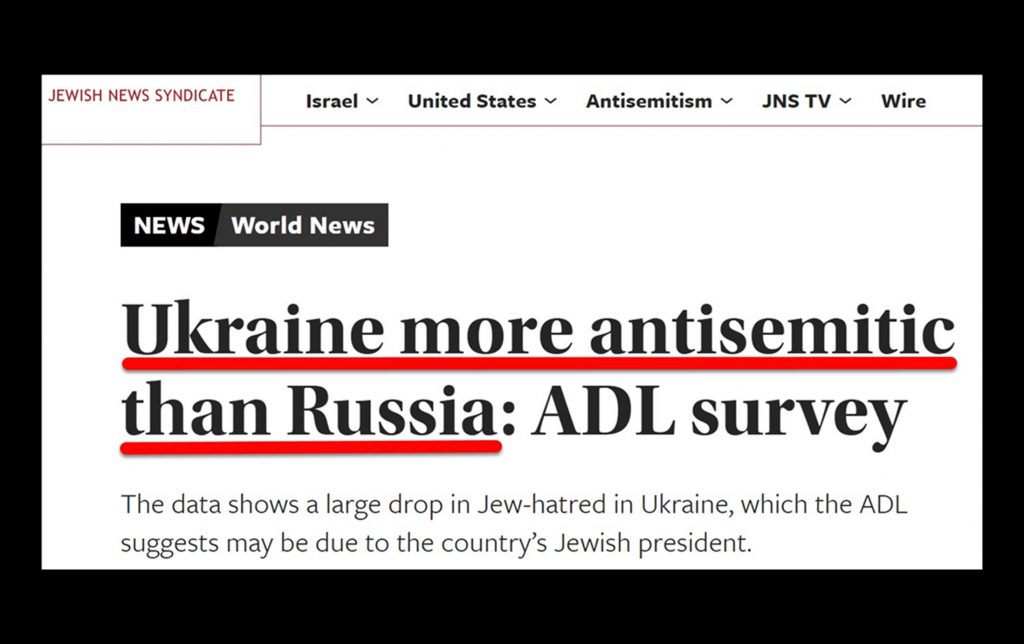Antisemitism: numbers games against the backdrop of Russia's war on Ukraine
On 31 May 2023 the US-based Anti-Defamation League (ADL) published a survey of antisemitic attitudes in Europe. The media instantly started pumping out headlines stating that the ADL survey paints Ukraine as being more antisemitic than Russia.
According to the ADL, 29% of Ukrainians hold antisemitic attitudes, which is higher than in Russia (26%).
While 36% of surveyed Russians say that Jews are more loyal to Israel than to the country where they live, 38% of Ukrainians agree with this antisemitic trope. The ADL survey found that 19% of Ukrainians think that the "Holocaust is a myth and did not happen," compared to 17% of Russians.
In Ukraine, 53% of respondents agree with the most widespread anti-Jewish stereotypes: "Jews have too much power in the business world," while 44% of Russians hold the view that "Jews don't care what happens to anyone but their own kind."
The only positive note that differentiates Ukrainians from Russians is their attitude to the Holocaust. According to the ADL survey, 27% of Russians are not aware of the Holocaust, compared to 18% of Ukrainians. But among those who know about the Holocaust, more Ukrainians (19%) deny it than Russians (17%).
The ADL reports that the most drastic decline in Jew hatred was recorded in Ukraine, where it declined from a record 46% index score in 2019 to 29% in 2023.
In my view, if Ukrainian citizens were to have been told in 2019 that almost every second person is an antisemite, they would have been very surprised, especially considering that 73% of Ukrainians voted for a Jewish candidate in that year's presidential elections.
Jonathan Greenblatt, CEO and national director of ADL, stated that "the dramatic improvement in antisemitic attitudes in Ukraine seems linked to the popularity of President Zelensky," whose approval ratings rose sharply in the last year and a half as a result of his resistance to Russian military aggression.
"While the survey findings do not directly address questions of causality, there's no doubt that having a Jewish president who is being praised for his response to Russian aggression seems to have affected perceptions of Jews among ordinary Ukrainian citizens," Greenblatt added.
The ADL survey was conducted between November 2022 and February 2023, and was based on responses from 6,569 adult Europeans, one thousand of whom were Ukrainians and Russians. One-quarter of the surveyed Ukrainians did not live in Ukraine at the time of the survey, but were living as war refugees in EU countries.
Now, let's look at this antisemitism index through a different lens. Five hundred Ukrainian citizens were polled during military actions against their country. Of them, 125 were surveyed outside of Ukraine, from which they had fled as refugees. Based on the attitudes of these 500 people, this American organization draws conclusions about the true attitudes of a country with a population of 35 million which is fighting for its very existence.
I will add here that if a different group of 500 Ukrainian citizens had been polled, perhaps the "antisemitism index" findings would be different.
This reminds me of the global antisemitism index that was published by Israel's Ministry of Diaspora Affairs in 2019. In the section listing antisemitic cities in the world, the Ukrainian city of Dnipro (formerly Dnipropetrovsk) somehow landed in third place.
It came to light later that the software used to record antisemitic posts and anti-Israel comments had summarized all the posts, which happened to have been written in the Arabic language by Arab students living in Dnipro, making it look as though this Ukrainian city was one of the world's most antisemitic hubs in 2019.
Now, a word about citizen attitudes in Russia, as per the 2023 ADL survey. Can one really say that honest answers to a sociological survey are possible under the current Putin regime, given that all analysts state that Russians have been taught to conceal the truth and refrain from expressing their true thoughts because of their fear of being punished?
You can survey people in tranquil countries like Belgium or Switzerland, and expect honest answers from them. But in circumstances where mouths are shut, and arrests take place, the citizen of the RF will express the position that is least dangerous for him or her and which corresponds most closely to the government's general line.
Where Ukraine and Russia are concerned, this begs the question of how realistic all these "antisemitism indexes" are.
We can be sure of one thing. These numbers games will be exploited by Putin's propaganda machine in his information war against Ukraine.
Text: Shimon Briman (Israel).
Translated from the Ukrainian by Marta D. Olynyk




















